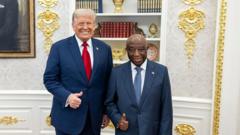**The recent congressional hearing highlights deep divisions over seabed mining as President Trump's administration pushes forward with its executive order, raising concerns about environmental impacts and business viability.**
**Trump’s Seabed Mining Initiative Sparks Congressional Divisions**

**Trump’s Seabed Mining Initiative Sparks Congressional Divisions**
**Analysis of the Environmental Debate Following Trump's Executive Order**
In the wake of President Trump’s recent executive decision to hasten seabed mining, tensions mounted during a congressional hearing as opposing sides voiced their opinions on this contentious issue. The Metals Company, led by CEO Gerard Barron, swiftly submitted the first permit application post-order, signaling a push for the extraction of valuable minerals such as cobalt and nickel from the ocean floor’s submerged nodules.
During a hearing at the natural resources committee, Barron commended Trump’s action as a “starting gun” for initiating seabed mining endeavors. However, the event saw sharp disagreements between Republican supporters and Democratic critics. While proponents underscored the potential economic benefits of this untested practice, detractors raised significant alarm over environmental repercussions.
The Trump administration’s stance includes exploration not only in U.S. territorial waters but also traversing the contentious waters governed by international treaties under the International Seabed Authority. Critics, including Representative Jared Huffman from California, strongly condemned the plan as “reckless,” arguing that the mining operation could substantially threaten marine life and ecosystems.
Moreover, doubts linger regarding the practicality of the venture, with some Democrats questioning the looming demand for cobalt and nickel, especially as electric vehicle manufacturers shift toward alternative battery technologies that do not rely on these metals. The challenges faced reflect the ongoing debate over balancing economic interests with environmental stewardship in the shadow of unprecedented oceanic exploration.
During a hearing at the natural resources committee, Barron commended Trump’s action as a “starting gun” for initiating seabed mining endeavors. However, the event saw sharp disagreements between Republican supporters and Democratic critics. While proponents underscored the potential economic benefits of this untested practice, detractors raised significant alarm over environmental repercussions.
The Trump administration’s stance includes exploration not only in U.S. territorial waters but also traversing the contentious waters governed by international treaties under the International Seabed Authority. Critics, including Representative Jared Huffman from California, strongly condemned the plan as “reckless,” arguing that the mining operation could substantially threaten marine life and ecosystems.
Moreover, doubts linger regarding the practicality of the venture, with some Democrats questioning the looming demand for cobalt and nickel, especially as electric vehicle manufacturers shift toward alternative battery technologies that do not rely on these metals. The challenges faced reflect the ongoing debate over balancing economic interests with environmental stewardship in the shadow of unprecedented oceanic exploration.


















